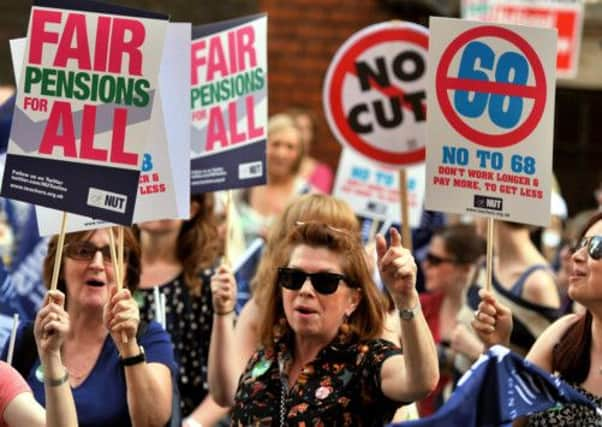Teaching unions plan to strike in row over pay and conditions


The country’s two biggest teaching unions announced a rolling programme of strikes yesterday, which will begin in the North West on June 27.
More are set to follow in the autumn term, with a national strike planned before Christmas.
Advertisement
Hide AdAdvertisement
Hide AdThe action would affect most schools across England and Wales. The move, announced by the National Union of Teachers (NUT) and the NASUWT, is an escalation of a continuing dispute with the Government. A spokesman for the Department for Education said it was “very disappointed” the unions had decided to strike.
Both unions have already been taking part in industrial action, short of stoppages, but NUT general secretary Christine Blower said they have had no engagement from Education Secretary Michael Gove over the dispute.
She said: “We have decided we must make an announcement that we will move to strike action in a bid to get the Secretary of State to listen seriously, and to seek to achieve a resolution in this dispute.”
She said that strikes will begin on June 27 in schools in local authorities in the North West and a series of rallies across England Wales.
Advertisement
Hide AdAdvertisement
Hide Ad“There will be further action in the autumn and a national strike to be called before Christmas,” she added.
The unions have put a new list of demands to Mr Gove, calling on him to suspend the introduction of performance-related pay, set to be brought in later this year, and to publish an evaluation of the Teachers’ Pension Scheme.
The unions also want Mr Gove to “commit to genuine engagement” by setting up a series of meetings to discuss the dispute.
NASUWT general secretary Chris Keates said: “We have three very reasonable demands that we are making to the Secretary of State that can stop disruption to schools from June onwards...The time has come for the Secretary of State to listen to the concerns of teachers and school leaders. He has recklessly pursued a relentless attack on the profession and teachers’ patience has been exhausted.”
Advertisement
Hide AdAdvertisement
Hide AdThe last time the unions took part in a national walkout was in November 2011 as part of a wider public sector strike over pensions.
A DfE spokesman said: “We are very disappointed that the NUT and NASUWT have decided to take strike action, which less than a quarter of teachers actually voted for. Industrial action will disrupt pupils’ education, hugely inconvenience parents and damage the profession’s reputation in the eyes of the public at a time when our reforms are driving up standards across the country.
“We think giving schools the freedom to reward good performance is much fairer than current arrangements which see the vast majority of teachers automatically getting a pay rise each year. We have met frequently with the NUT and NASUWT to discuss their concerns and will continue to do so.”
Shadow Education Secretary Stephen Twigg said: “The Education Secretary needs to end his hostile rhetoric about teachers. His decision to scrap Labour’s Social Partnership ended a useful vehicle to resolve disputes without industrial action.
Advertisement
Hide AdAdvertisement
Hide Ad“Strikes are a sign of failure and all sides involved must make every effort to avert them. Like parents and pupils, we do not want to see schools disrupted.”
Mary Bousted, general secretary of the Association of Teachers and Lecturers (ATL), said: “ATL absolutely shares with the NUT and NASUWT their concerns about teacher morale, the break up of national pay structures and the government attacks on pensions.
“Where ATL part ways is that we survey our members regularly to gather their opinions, and while we agree that teachers’ morale is very low and this coalition Government is no friend to teachers, when it comes to pay and terms and conditions we are not seeing any evidence that our members are willing to engage in industrial action.”